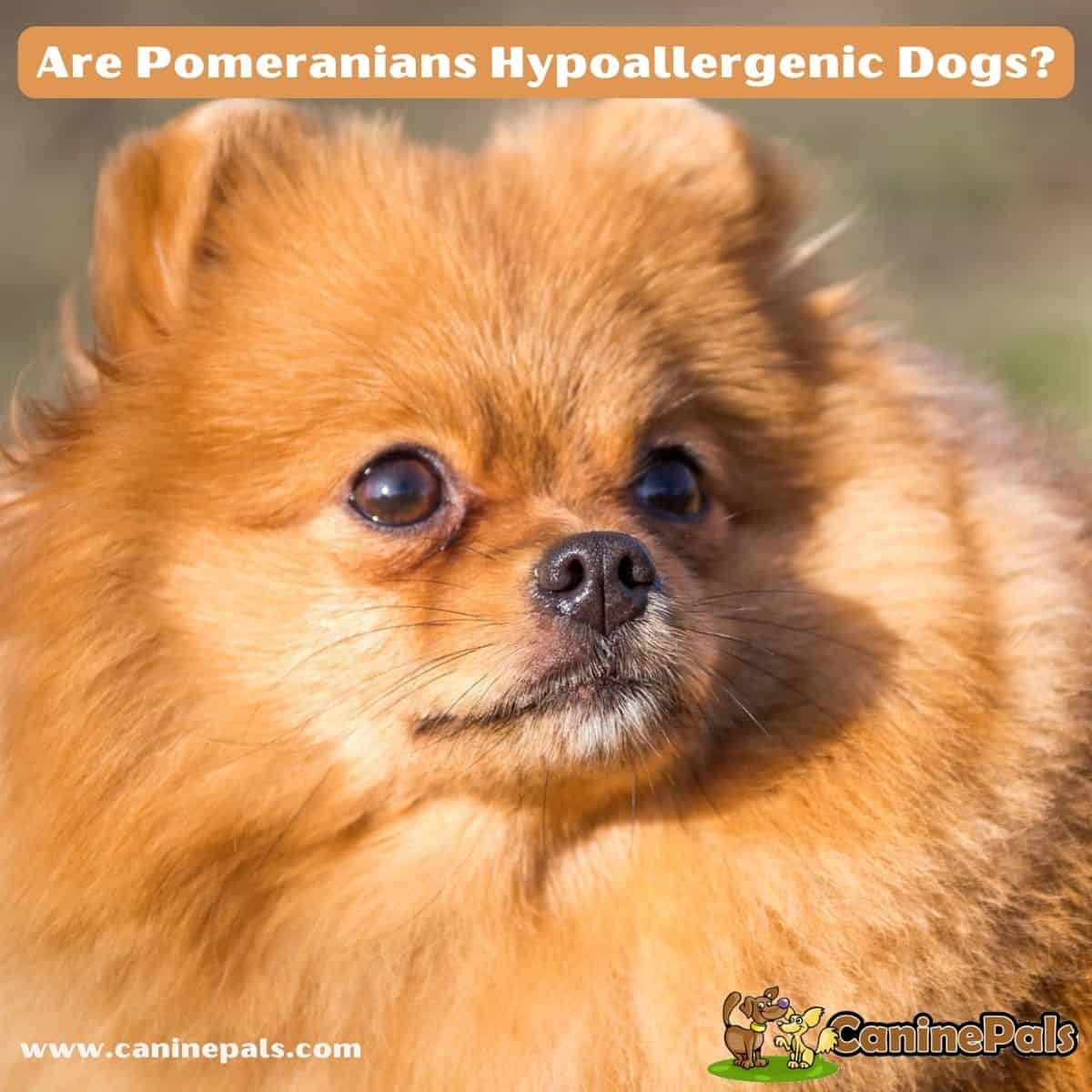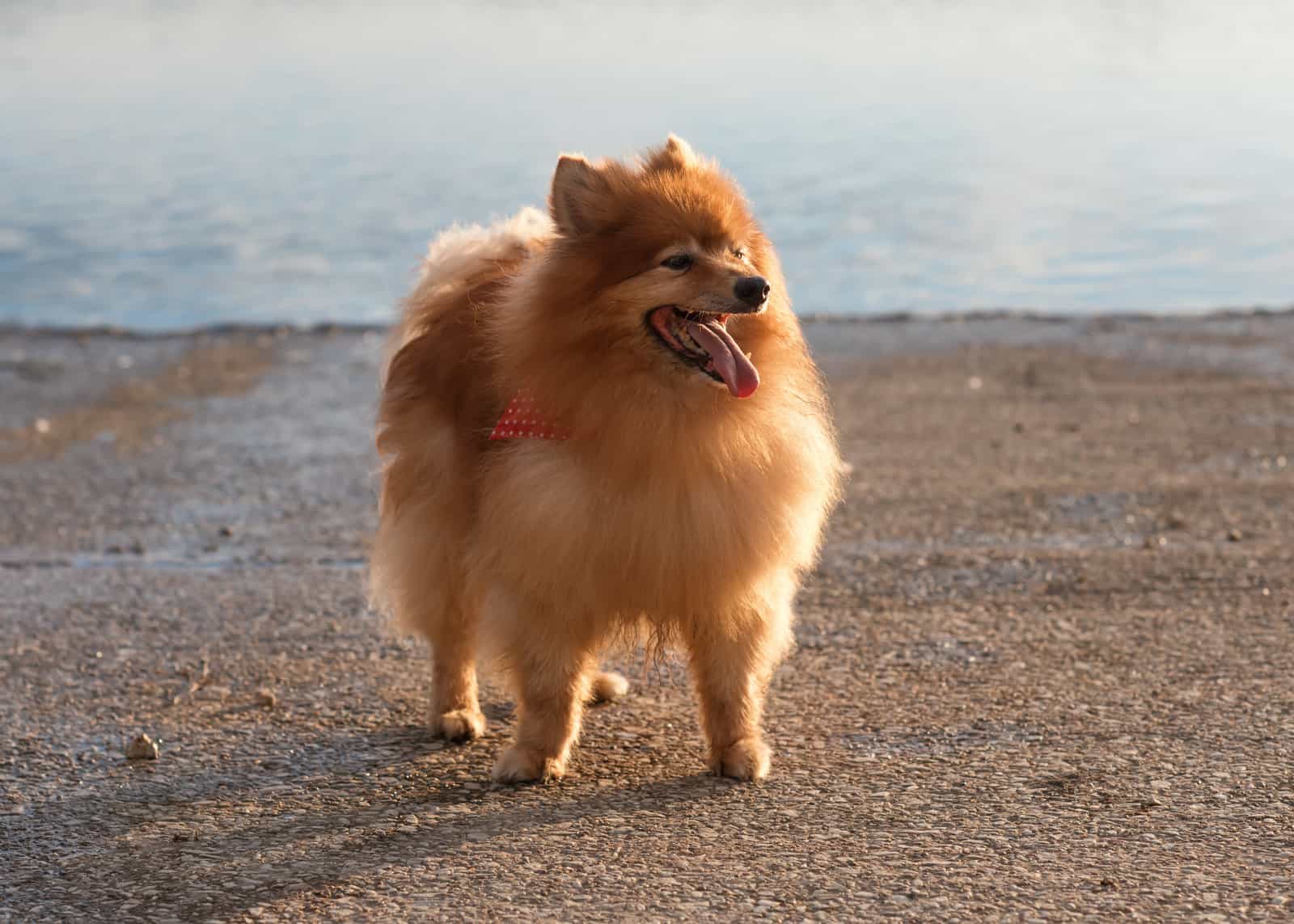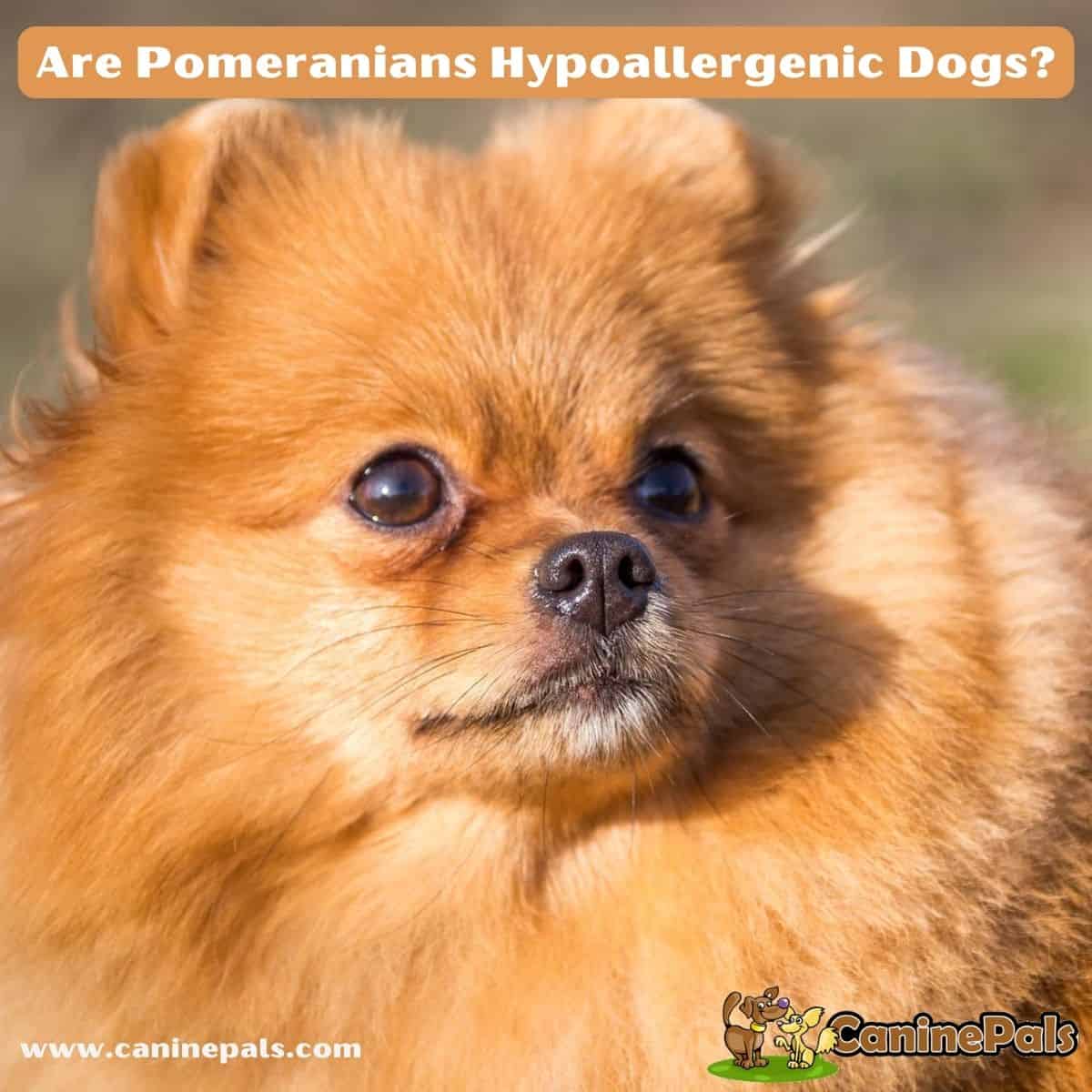Last Updated on April 9, 2024 by Denise Leo. Post first published on May 11, 2023.
Pomeranians are a beloved breed among dog lovers, known for their fluffy appearance and affectionate personalities. However, for individuals with allergies, owning a dog can be challenging.
In this article, I will explore whether Pomeranians are hypoallergenic and provide insights from two experts in the field: Denise Leo from Dochlaggie Pomeranians and Pomeranian Headquarters.
Are Pomeranians Hypoallergenic?
Unfortunately, Pomeranians are not hypoallergenic. If you’re an allergy sufferer considering a Pomeranian as a pet, it’s essential to know that they shed their coat, especially during the spring and fall.
Pomeranians have a thick double coat, which means they shed quite a bit. This shedding can lead to allergens in the dog’s environment, causing allergies in sensitive individuals. While no dog breed is truly hypoallergenic, some breeds may produce fewer allergens than others.
Denise Leo: “Pomeranians are not hypoallergenic, but regular grooming can help manage shedding and reduce the amount of allergens present in the environment.
Pomeranian Headquarters: “Individuals with allergies may consider allergy shots or other treatments to manage their symptoms if they wish to adopt a Pomeranian.“
Denise Leo, Dochlaggie Pomeranian Dogs
Denise Leo, a Pomeranian breeder and owner of Dochlaggie Pomeranian dogs, confirms that Pomeranians are not hypoallergenic dog breed. She notes that Pomeranians shed quite a bit, which can lead to environmental allergens.
Denise Leo advises individuals with allergies to spend time with Pomeranians before adopting to ensure they do not have an allergic reaction. Denise Leo also suggests that regular grooming can help manage shedding in Pomeranians, reducing the amount of allergens present in the environment.
She recommends brushing the dog’s coat at least twice weekly with a pin brush, slicker brush, and metal comb to remove loose hair and prevent matting. Additionally, she advises providing the dog with a healthy diet and plenty of exercise to promote overall good health.
Pomeranian Headquarters
Pomeranian Headquarters, a resource for all things Pomeranian, also confirms that Pomeranians are not hypoallergenic. They note that Pomeranians have a thick double coat that sheds heavily twice a year.
During these times, they recommend more frequent grooming and using a de-shedding tool to remove shedding fur and reduce the number of allergens in the environment. Pomeranian Headquarters advises individuals with allergies to spend time with Pomeranians before adopting to ensure they do not have an allergic reaction.
They suggest that individuals with allergies may consider allergy shots or other treatments to manage their symptoms if they wish to adopt a Pomeranian.

What are Hypoallergenic Dogs?
It helps to understand what the word hypoallergenic means. People with dog allergies are allergic to a protein in pet dander or dead skin cells, and dander often attaches itself to loose hair.
So, a Pomeranian that sheds is likely to cause dog allergies as the loose hair spreads the pet dander around. Dogs that are considered hypoallergenic are just low-shedding breeds. And the Pom, while not a heavy shedder, sheds their fur a moderate amount.
Facts about Hypoallergenic Dog Breeds: Debunking Myths
Many people believe that hypoallergenic dogs cause zero allergic reactions. However, according to the American Kennel Club, this is a common misconception. While certain breeds are less likely to trigger dog allergies, there is no such thing as a 100% hypoallergenic dog.
For those with allergies looking for a furry companion, there are allergy-friendly breeds such as Bichon Frise, Chinese Crested, American Hairless Terrier, Spanish Water Dog, Poodle, Schnauzer, Maltese, and Irish Water Spaniel.
What Causes Allergic Reaction to Dogs?
Did you know that dog hair is not the only thing that triggers allergies? While some dogs may have fluffy coats, others are entirely hairless. So, what causes allergic reactions to dogs? The answer is pet dander – flaky dead skin cells found in animal hair but not visible to the human eye.
Sadly, pet dander is a leading allergen and can even cause severe allergies. It’s essential to note that there is no direct correlation between potential dog hair and dander.
Just because a dog is hairy doesn’t mean it will lead to allergies, and a hairless dog doesn’t necessarily mean it’s a hypoallergenic dog breed.

Are Pomeranians Allergy Friendly?
Are you considering a Pomeranian as a pet but have allergies? It’s essential to be aware that Pomeranians are not considered allergy-friendly dogs.
Picture this scenario: You come home with an adorable Pomeranian companion but soon discover you have dog allergies. It’s a frustrating situation to face.
To ensure you can handle having one as a companion, spend time with different Pomeranians beforehand. Spending time with a Pom dog will help you make an informed choice and avoid unwanted reactions. Severe allergy sufferers should consider exploring different dog breeds for a more comfortable living experience.

How Much Do Pomeranians Shed?
The Pomeranian dog, ranked 24th on the AKC’s (American Kennel Club) list of most popular dog breeds in 2021, is famous for its distinctive puffy fur coat. This unique feature is what makes them a desirable breed to pet lovers.
However, with this beautiful appearance comes a challenge. The Pomeranian has a double coat consisting of an outer coat and an undercoat. While the outer fur helps to keep them cool, the undercoat keeps them warm in winter.
As with other double-coated dogs, Pomeranians “blow their coats” twice a year, in spring, autumn, or early winter. During these periods, they shed a lot of hair, and dog owners may need to vacuum more frequently to manage all the loose fur.
Managing Pomeranian Shedding
Pomeranian owners should groom their dogs regularly to reduce the amount of dog hair that falls off. Other causes of excess shedding include conditions like stress, poor nutrition, parasites, and hormonal issues.
Ensure you see your veterinarian immediately if you suspect any of these conditions.
Investing in a few air filters can also help minimize the amount of hair and pet dander circulating in your home. Lastly, proper nutrition is essential.
Make sure you pick quality food that will help maintain your dog’s overall health. With these tips, you can still enjoy the company of your Pomeranian without suffering from allergies.
Denise Leo’s Advice on Managing Pomeranian Shedding
| Grooming | Diet | Exercise |
|---|---|---|
| Brush coat twice a week with a slicker brush and metal comb | Provide a balanced diet rich in protein, vitamins, and minerals | Provide regular exercise to reduce stress levels |
| Regular baths with a good-quality shampoo |
Pomeranian Headquarters’ Advice on Managing Pomeranian Shedding
| Grooming | Allergies |
|---|---|
| Brush coat frequently with the de-shedding tool during the shedding season | Spend time with Pomeranians before adopting to ensure no allergic reaction |
| Regular grooming can reduce the amount of allergens present in the environment | Consider allergy shots or other treatments to manage symptoms |

Final Thoughts: Are Pomeranians Hypoallergenic?
In conclusion, Pomeranian dogs are not hypoallergenic due to their thick double coat and shedding habits. However, with proper grooming and care, the number of allergens in the environment can be reduced.
Experts like Denise Leo from Dochlaggie Pomeranians and Pomeranian Headquarters recommend spending time with Pomeranians before adopting to ensure no allergic reaction and managing shedding through regular grooming, a healthy diet, and exercise.
Individuals with allergies may consider allergy shots or other treatments to manage their symptoms if they wish to adopt a Pomeranian. It’s essential to understand the limitations of a breed’s hypoallergenic status and be prepared to take the necessary steps to manage allergies if you’re considering adopting a Pomeranian.
Copyright CaninePals.Com. All Rights Reserved.
References and Further Reading:
- Official Standard of the Pomeranian (AKC). American Kennel Club, 2011.
- Official English Kennel Club Pomeranian Breed Standard, 2017.
- Kimbering Pomeranians “1891-1991”.
- Denise Leo, The Pomeranian Handbook.
- L.Ives, Show Pomeranians.
- L.Ziegler Spirer & H.F. Spirer, This is the Pomeranian.
- FEDERATION CYNOLOGIQUE INTERNATIONALE (FCI) German Spitz, including Keeshond and Pomeranian Breed Standards. PDF file.



